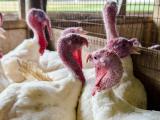Animal health officials in Minnesota yesterday lifted a ban on poultry exhibitions and other bird events, one of the steps the state took in May to curb the multistate spread of highly pathogenic H5N2.
In the wake of the outbreaks this spring, several states instituted similar bans.
Meanwhile, the US Department of Agriculture (USDA) recently announced a second request for proposals for poultry avian influenza vaccines to stock a national stockpile, one of the steps federal officials have taken in response to the outbreaks.
Months of flu-free findings
The Minnesota Board of Animal Health (MBAH) said in a statement that the easing of the measure is effective as of today, clearing the way for birds to appear at fairs, swap meets, exotic sales, petting zoos, and other settings where they commingle or gather.
No new cases have been detected in Minnesota since Jun 5, which paved the way for the ban to be lifted, the MBAH said. It added that over the course of the outbreak, the virus was detected on 108 farms in 23 of the state's counties.
As of Nov 12, all of the farms have cleaned and disinfected their facilities, and 104 have been cleared to restock their barns with birds, according to the MBAH.
The virus mainly hit turkey farms in Minnesota, the nation's top turkey-producing state. More than 9 million poultry were affected in the state's outbreak. Iowa egg producers also bore much of the outbreak burden.
Nationally, about 48 million birds in 219 outbreaks that occurred between Dec 2014 and Jun 2015 were affected by the outbreak, according to the USDA's Animal and Plant Health Inspection Service (APHIS).
Call for more vaccine proposals
In a related development, APHIS recently issued a second call for companies to submit proposals for highly pathogenic avian influenza vaccine, so that the country is prepared in the event of a return of the virus. In a Nov 20 statement, it said its goal is to get multiple manufacturers lined up to provide a variety of H5 vaccines for the emergency stockpile.
APHIS emphasized that it has not approved the use of a vaccine, but it wants to be prepared in case a decision is made to use it.
The department made its first call for avian influenza vaccines in the middle of August, and on Oct 13 announced that it awarded two $6 million contracts to two companies: Harrisvaccines, based in Ames, Iowa, and Ceva, a French company that has production facility in Lexena, Kan.
See also:
Nov 30 Minnesota BAH statement
APHIS AI outbreak backgroun
Nov 20 APHIS announcement
Oct 14 CIDRAP News scan "USDA awards contracts for stockpiled avian flu vaccine for poultry"




















